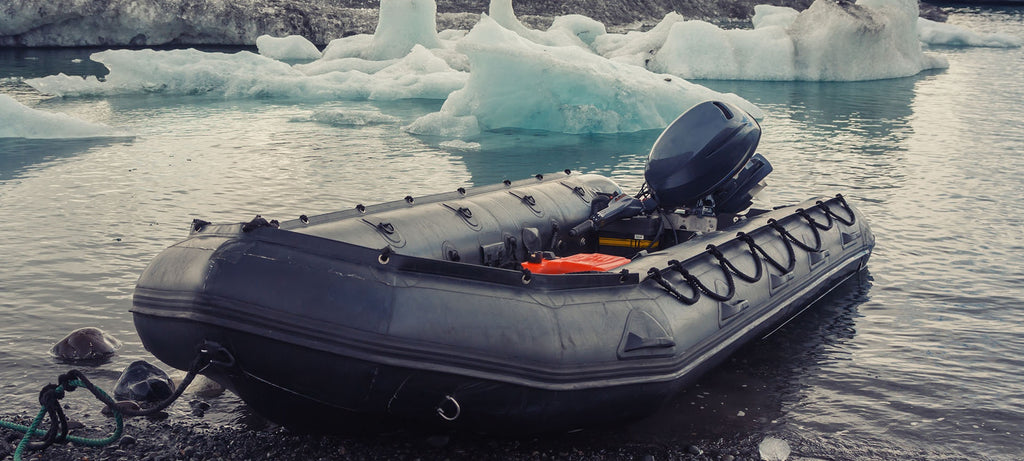Difference Between Rubber Boat and PVC Boat
Posted by JAMES S.

Whether you already own an inflatable boat or you have just begun to shop for one, you have likely been faced with the question: should I get a rubber inflatable boat or a PVC inflatable boat?
Both are common materials for inflatable boats and both can be an excellent choice in different situations. Generally, a PVC boat is likely to be the best option for most boaters and we will go into why that is later in this post.
Here we will look at the primary differences between these two materials, their best uses, and which may be best for your needs. Let’s get to it!
The Primary Differences Between Rubber and PVC Boats
PVC and rubber are the two primary materials you will find modern inflatable boats to be made of. Both, predictably, have their advantages and disadvantages. Rubber is a natural material that is considered more durable compared to PVC, a kind of synthetic polymer (aka plastic).
However, rubber is also significantly more expensive and less common while PVC is cheaper and more widely available. This makes it an overall better and more accessible choice for most inflatable boat enthusiasts.
More importantly, PVC boat production has become more sophisticated and this material is now more durable than it once was. Construction techniques have also improved and PVC can now rival rubber in many regards.
In short, if your main experience with a PVC boat was as a flimsy pool toy, it is time to give this interesting material another shot.
Rubber vs PVC Inflatable Boats
Now, let’s break down some of the more important aspects of where each material shines and some potential drawbacks.
Resistance to UV Light
Any material you will be using outside requires some care and consideration when it comes to UV exposure from the sun. In this category, rubber does have the advantage. Rubber is typically not very affected by UV rays and will not degrade simply due to sun exposure.
However, this is really only a major concern if you are using your boat out in the sunny tropics and cannot store it in a shaded area. If that is the case, rubber could be a better choice.
In most other circumstances a PVC boat is still a good option. You can protect your PVC boat from the sun by ensuring it is clean and dry before being stored in a shaded area. Ideally, a PVC boat should be stored away from the elements in general to further extend its life.
Weight and Portability
Another area where most boating hobbyists prefer PVC is in portability. Rubber is much heavier and more difficult to fold, making it much harder to transport. PVC, on the other hand, can be easily folded into a trunk and carried quite easily while still being durable.
Resistance to Spills
Much like UV resistance, this is another area where rubber is more durable. Substances like motor oil or gas may be near your boat and rubber will resist staining or damage from them better than PVC will.
If you have a PVC boat, you will need to take extra care around these substances. Make sure to wipe and clean any spills as quickly as possible. That being said, PVC will not instantly fall apart due to exposure to these chemicals, just a bit more care is needed.
Air Loss
Inflatable water crafts of any sort will lose air over time, even if there is not a specific puncture. This is an area where PVC boats more often have the advantage since their seams are welded.
Welded seams are less prone to air loss than the glued seams of a rubber boat which are susceptible to “wicking.” Wicking is an issue specific to rubber boats.
With wicking, the air from inside the boat can actually enter into the rubber material itself. Though this air has not escaped in the traditional sense, it is now hovering inside the fabric versus within the tube of the boat.

Importance of Quality Inflatable Boats
As you can see, inflatable boats come with a range of qualities. While even cheaper inflatable boats and rafts can be fun, you do not want to skimp on quality if you plan to use your boat regularly. This will help prevent your time on the water being ruined due to a punctured hull or busted seam.
Better quality boats are also typically easier to fix and the repairs will hold longer. Additionally, they will also hold up in storage better as well.
This means even if you only plan to use your boat once or twice a year, it is still better to look for a higher quality model. Otherwise, you may likely end up spending more in the long run as you need to replace your boat too often.
Why You Probably Do Not Need a High-Density Inflatable Boat
Though quality is important, it is also good to note that most boaters do not require high-density PVC.
This kind of PVC is less common and much more expensive. It is typically only used for boats that will be undergoing extreme circumstances such as boats used in search and rescue missions, for military purposes, or for use in arctic conditions.
Generally, when looking for a PVC inflatable boat you will just want to make sure that it has welded, not glued, seams. You should also look for a boat that is suited for what you want to use it for. For example, a fishing boat will be different from one approved for whitewater rafting conditions.
Start Shopping for Inflatable Boats
No matter the kind of inflatable boat you choose, this is a convenient and affordable way to start enjoying the great outdoors. At Perun Outdoors, we are inflatable boat enthusiasts who strive to bring boats to our customers that make the boating experience safer and more enjoyable.
Each of our inflatable boats and kayaks is made of high quality PVC and constructed with hot-air welded seams for superior durability. We offer a range of sizes perfect for boating on your own or with a group.
Visit our catalog or contact us to get started finding the perfect inflatable boat or kayak for you.

